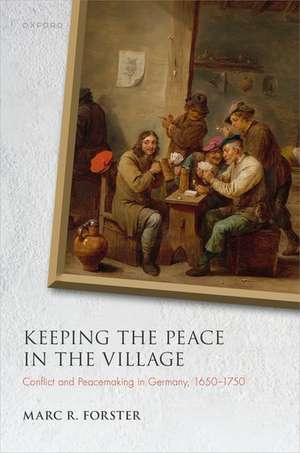Keeping the Peace in the Village: Conflict and Peacemaking in Germany, 1650-1750: Studies in German History
Autor Marc R. Forsteren Limba Engleză Hardback – 26 feb 2024
Din seria Studies in German History
- 14%
 Preț: 690.86 lei
Preț: 690.86 lei - 14%
 Preț: 691.62 lei
Preț: 691.62 lei - 13%
 Preț: 643.66 lei
Preț: 643.66 lei - 25%
 Preț: 515.91 lei
Preț: 515.91 lei - 17%
 Preț: 580.82 lei
Preț: 580.82 lei - 25%
 Preț: 522.20 lei
Preț: 522.20 lei - 23%
 Preț: 472.57 lei
Preț: 472.57 lei - 14%
 Preț: 921.81 lei
Preț: 921.81 lei - 17%
 Preț: 583.11 lei
Preț: 583.11 lei - 25%
 Preț: 582.09 lei
Preț: 582.09 lei -
 Preț: 225.08 lei
Preț: 225.08 lei - 9%
 Preț: 249.36 lei
Preț: 249.36 lei -
 Preț: 186.02 lei
Preț: 186.02 lei - 23%
 Preț: 736.03 lei
Preț: 736.03 lei - 23%
 Preț: 737.92 lei
Preț: 737.92 lei - 16%
 Preț: 575.10 lei
Preț: 575.10 lei - 26%
 Preț: 558.78 lei
Preț: 558.78 lei -
 Preț: 260.90 lei
Preț: 260.90 lei - 17%
 Preț: 581.42 lei
Preț: 581.42 lei - 12%
 Preț: 615.76 lei
Preț: 615.76 lei - 23%
 Preț: 733.28 lei
Preț: 733.28 lei -
 Preț: 151.33 lei
Preț: 151.33 lei -
 Preț: 294.88 lei
Preț: 294.88 lei - 23%
 Preț: 729.63 lei
Preț: 729.63 lei - 23%
 Preț: 793.26 lei
Preț: 793.26 lei - 23%
 Preț: 737.92 lei
Preț: 737.92 lei - 23%
 Preț: 734.72 lei
Preț: 734.72 lei -
 Preț: 254.88 lei
Preț: 254.88 lei - 23%
 Preț: 734.14 lei
Preț: 734.14 lei -
 Preț: 253.38 lei
Preț: 253.38 lei -
 Preț: 522.39 lei
Preț: 522.39 lei - 23%
 Preț: 734.87 lei
Preț: 734.87 lei - 23%
 Preț: 791.96 lei
Preț: 791.96 lei - 23%
 Preț: 790.52 lei
Preț: 790.52 lei - 23%
 Preț: 734.59 lei
Preț: 734.59 lei -
 Preț: 259.40 lei
Preț: 259.40 lei - 23%
 Preț: 976.66 lei
Preț: 976.66 lei -
 Preț: 253.22 lei
Preț: 253.22 lei - 23%
 Preț: 734.14 lei
Preț: 734.14 lei -
 Preț: 258.88 lei
Preț: 258.88 lei -
 Preț: 256.59 lei
Preț: 256.59 lei - 23%
 Preț: 735.29 lei
Preț: 735.29 lei - 30%
 Preț: 503.51 lei
Preț: 503.51 lei
Preț: 473.29 lei
Preț vechi: 655.03 lei
-28% Nou
Puncte Express: 710
Preț estimativ în valută:
90.59€ • 95.10$ • 74.84£
90.59€ • 95.10$ • 74.84£
Carte disponibilă
Livrare economică 30 decembrie 24 - 04 ianuarie 25
Preluare comenzi: 021 569.72.76
Specificații
ISBN-13: 9780198898474
ISBN-10: 0198898479
Pagini: 240
Dimensiuni: 160 x 240 x 22 mm
Greutate: 0.52 kg
Editura: OUP OXFORD
Colecția OUP Oxford
Seria Studies in German History
Locul publicării:Oxford, United Kingdom
ISBN-10: 0198898479
Pagini: 240
Dimensiuni: 160 x 240 x 22 mm
Greutate: 0.52 kg
Editura: OUP OXFORD
Colecția OUP Oxford
Seria Studies in German History
Locul publicării:Oxford, United Kingdom
Notă biografică
Marc R. Forster earned his BA from Swarthmore College and an MA and PhD from Harvard University. He has been Professor of History at Connecticut College since 1990. He has received fellowships from the Fulbright Foundation, the NEH, the Alexander von Humboldt Stiftung, and the Guggenheim Foundation to support archival research in Germany. Forster's first three books examined aspects of German Catholicism in the early modern period, with a focus on the development of Catholic identity in the rural communities of Southwest Germany. His fourth book is based on a study of court records and examines peace and conflict in German villages in the century after the end of the Thirty Years' War.
